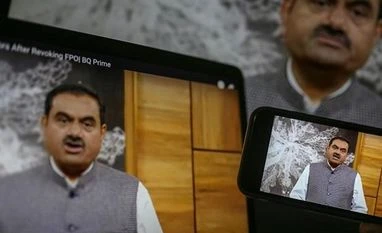Financial institutions from New York to London and Tokyo are dissecting their exposure to the empire of Gautam Adani, who was Asia’s richest man only a few days ago.
The billionaire’s interests, which include ports, power plants and coal mines, have fallen in value by more than $100 billion since Hindenburg Research’s fraud allegations last week. The Indian tycoon vehemently denied the claims but was forced to abruptly scrap a $2.4 billion stock offering for his flagship Adani Enterprises Ltd.
His backers include Citigroup Inc., Credit Suisse Group AG and Barclays Plc. They are among banks pursuing a range of options to curb the risk of losses, including asking for more collateral and halting the use of Adani company securities to cover margin loans to wealth clients.
Lending to India’s tycoons and their companies was until recently a money-spinner for global banks seeking to cash in on one of the world’s fastest growing economies. The country has also been viewed as a buffer to growth in China, whose economy was pummeled by the now-abandoned Covid Zero policy and crackdowns on private enterprise.
“India is clearly a difficult place to lend money,” said Tom Kirchmaier, professor at the Centre for Economic Performance at the London School of Economics. “Banks are still desperate for business, and this is just a reminder that India may not be able to compensate a decline of Chinese business.”
Lending to India’s tycoons and their companies was until recently a money-spinner for global banks seeking to cash in on one of the world’s fastest growing economies. The country has also been viewed as a buffer to growth in China, whose economy was pummeled by the now-abandoned Covid Zero policy and crackdowns on private enterprise.
“India is clearly a difficult place to lend money,” said Tom Kirchmaier, professor at the Centre for Economic Performance at the London School of Economics. “Banks are still desperate for business, and this is just a reminder that India may not be able to compensate a decline of Chinese business.”
Many global lenders are also still smarting from the implosion of another billionaire’s company, Archegos Capital Management, which failed in 2021. Multibillion-dollar losses, regulatory fines and sweeping management changes followed that collapse — a debacle the banks are keen to avoid repeating.
“Banks would not want to be the last ones left holding the bag — just look at Archegos and Greensill Capital and what happened to the banks that reacted slowly,” said Mak Yuen Teen, a professor at the National University of Singapore, who researches corporate governance.
To be sure, there’s no indication that Adani companies are facing a liquidity crunch.
The tycoon’s port business made payments on dollar bonds as scheduled Thursday. He’s also in talks with creditors to prepay some loans backed by pledged shares as he seeks to restore market confidence, a person with knowledge of the matter said. Goldman Sachs Group Inc. and JPMorgan Chase & Co. have told some clients that bonds related his business empire can offer value.
Adani showcased its extensive local and international bank relationships in a 413-page rebuttal to the short-seller’s allegations, which it called “a calculated attack on India.” Some of the most prominent names in banking are listed among 29 supporters, though the exact nature of their ties wasn’t disclosed.
Adani Group, which comprises half a dozen major companies, put up about $300 million worth of shares to maintain its collateral cover on a $1 billion loan, Bloomberg News reported on Jan. 31. The loan was made by a group of banks including Barclays.
Citigroup’s wealth unit, meanwhile, stopped accepting securities issued by Adani companies as collateral for margin loans after “negative news around the group’s financial health” led to dramatic price drops, according to an internal memo seen by Bloomberg News. Credit Suisse’s private banking unit had also made a similar change for the bonds.
Mizuho Financial Group Inc.’s securities division had past dealings with Adani and is examining the allegations being leveled against the conglomerate, the unit’s chief executive officer Yoshiro Hamamoto told reporters in Tokyo on Thursday. Mizuho Securities has managed debt issuance by Adani companies, public documents show.
Meanwhile, UBS Group AG Chief Executive Officer Ralph Hamers has said the bank’s exposure to the meltdown isn’t a matter of concern for the Swiss bank.
“I wouldn’t worry about it,” Hamers said in Bloomberg interview this week.
India’s central bank has asked lenders for details of their exposure to the Adani companies, people with knowledge of the matter have said. Domestic banks are standing by Adani, who has close ties to the Narendra Modi government.
Dinesh Khara, chairman of State Bank of India — the country’s biggest lender — told Bloomberg that its loans to the Adani Group are backed by cash-generating assets and overseas exposure is “nominal.” The lender has given loans of as much as $2.6 billion to companies in the Adani conglomerate, or about half of what is allowed under the rules, according to a person familiar with the matter.
Indian lender IDFC First Bank earlier Thursday said it is “comfortable” with its ties to Adani. Its outstanding funded exposure represents just 0.06% of the bank’s funded assets, while non-funded outstanding is 0.51%, and it is receiving payments on schedule.
Adani has repeatedly denied the allegations, called the short-seller’s report “bogus,” and threatened legal action.
His decision to withdraw Adani Enterprises’ follow-on share sale — the largest cancellation in Asia since 2015 according to Bloomberg-compiled data — won’t have any impact on existing operations and future plans, Adani said in a video speech Thursday.
)












